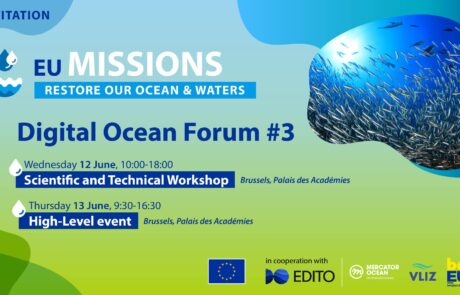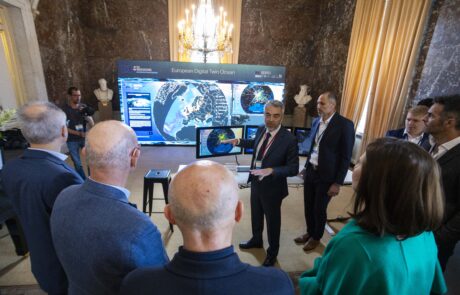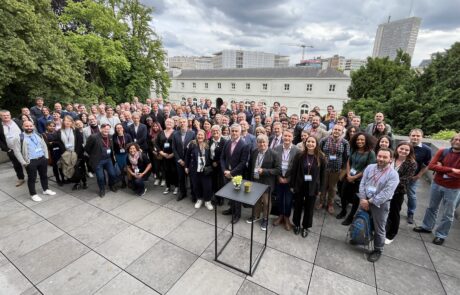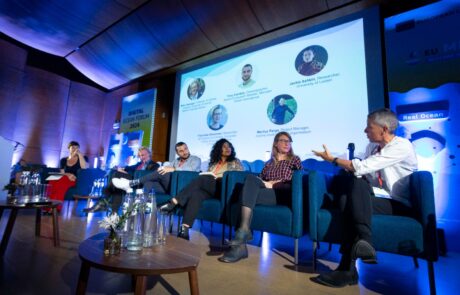The annual Digital Ocean Forum took place on 12 and 13 June 2024 in Brussels under the auspice of the Belgian presidency of the Council of the European Union (EU). Bringing together over 200 participants on site and 100s more online, this flagship event was organised by the European Commission Directorates of Research and Innovation and of Maritime Affaires and Fisheries (MARE), with support from Mercator Ocean International, the Flanders Marine Institute (VLIZ) and Seascape Belgium.
Pre-event 12 June | Scientific and Technical workshop for community of projects
Preceding the high-level event, a scientific and technical workshop took place gathering representatives from the community of projects funded by the European Union and national governments. During the workshop, the Mercator Ocean team walked the audience through the European Digital Twin Ocean (EDITO) platform, currently in a pre-operational stage, its current features and capabilities and future developments in store under the EDITO-Infra project. This was followed by shared experiences of using the platform and recommendations by three EDITO project partners from CMCC, Seascape Belgium and DELTARES. Participants, then separated into three breakout sessions to go into depth into topics of EDITO, including meeting user needs, interoperability considerations, and support to policy. The workshop concluded with key outcomes from these sessions and messages from the community.
13 June | Digital Ocean Forum
Day 2 served to showcase the concrete developments since the launch of the European Digital Twin Ocean initiative in February 2022 under the EU Mission “Restore our Ocean and Waters”. Opened by keynote speeches by representatives from the European Commission, and the Flanders and French governments, the event delved into what has been achieved so far, showcasing the EDITO platform’s features, capabilities and examples of applications.
Today, the platform is a single-entry point to freely access marine observation datasets, including data catalogues from the leading marine data services, the Copernicus Marine Service and European Marine Observation and Data Network (EMODnet). Powered by high-performance computing, providing access to cloud resources, the platform efficiently processes and analyses data, enabling complex simulations, manipulation and storage.
EDITO project partners demonstrated DTO applications to combat marine plastic pollution, support nature-based solutions against coastal hazards and inform marine biodiversity conservation efforts. Selected EU and national project representatives also shared their applications showing the significant value added if integrated into the EU DTO, including scalability, replicability to other regions, fast processing speeds, and easier access to data. For more information on DTO applications, click here.
Panel discussions brought together different actors and stakeholders to speak about the EU DTO’s future vision, including interoperability, integration of multidisciplinary data, inclusion and societal and ethical aspects.
The day wrapped up with a closing address by John Bell, the European Commission’s ‘Healthy Planet” Director who emphasised the collaborative efforts needed to achieve the ambitious goals set for the oceanic digital frontier – “With the launch of this DTO, we’re not just turning on a switch on an interesting digital project; we’re turning the lights on in the ocean and our future.”
Also see:
- European Digital Twin Ocean Initiative https://research-and-innovation.ec.europa.eu/funding/funding-opportunities/funding-programmes-and-open-calls/horizon-europe/eu-missions-horizon-europe/restore-our-ocean-and-waters/european-digital-twin-ocean-european-dto_en
- News article: European Commission unveils European Digital Twin of the Ocean prototype – https://research-and-innovation.ec.europa.eu/news/all-research-and-innovation-news/european-commission-unveils-european-digital-twin-ocean-prototype-2024-06-13_en
- News article: Revolutionising marine data: The launch of the European Digital Twin Ocean – https://www.brusselstimes.com/promoted/1108091/revolutionising-marine-data-the-launch-of-the-european-digital-twin-ocean
- Horizon Europe EDITO project website – edito.eu


